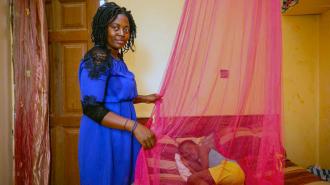Cameroon has launched the world’s first malaria vaccine program — a huge milestone on the path to a malaria-free future.
“We have been waiting for a day like this,” Mohammed Abdulaziz, head of disease control and prevention at the Africa CDC, told reporters. “We are not just witnessing history, but actively participating in a transformative chapter in Africa public health history.”
The disease: In 2021, there were an estimated 247 million cases of malaria globally and 619,000 deaths from the disease, predominantly in Africa. About 75% of those deaths were children younger than 5 years old.
While hundreds of millions of people survive malaria each year, they do not become immune. They can always be infected again by a disease-carrying mosquito, and these repeated infections, even if not deadly, take a serious toll on their immune system over time, leaving them at higher risk of developing other diseases.
“When children come for other vaccine appointments, they are given their malaria vaccine.”
Dorothy Achu
The malaria vaccine: Researchers have been trying to develop a malaria vaccine since the 1960s, and in 2021, the World Health Organization (WHO) determined that one was finally good enough to recommend for use: GlaxoSmithKline’s RTS,S (brand name Mosquirix).
The vaccine is administered in four doses, one each around ages 6 months, 7 months, 8 months, and 24 months. In phase 3 trials involving children and infants in Africa, it reduced the risk of contracting clinical malaria by 39% and severe malaria by 29% in the four years after a child received their first dose.
“While 39% efficacy seems low for a vaccine, when we consider the sheer burden of malaria, this means potentially a huge reduction in cases and deaths among children,” said Aaron Samuels, the CDC’s malaria program director in Kenya, in 2021.
What’s new? Cameroon — a nation in Central Africa that lost nearly 14,000 people to malaria in 2021 — has now launched the world’s first routine malaria vaccination program. Its goal is to vaccinate 250,000 children over the next two years, free of charge.
“When children come for other vaccine appointments, they are given their malaria vaccine,” Dorothy Achu, regional malaria adviser for the WHO, told the Financial Times.
Achu went on to note that getting their children fully vaccinated could be difficult for people who don’t live near a clinic, so the nation will need to establish programs that help ensure kids come back when they’re supposed to.
The vaccine’s relatively low efficacy also means other preventative measures — such as mosquito nets and insecticides — are still vitally important, as is the development of new, more effective malaria treatments.
Looking ahead: Including Cameroon, 20 African nations plan to launch malaria vaccination programs in 2024, but GSK says it can currently only manufacture 15 million doses a year — the WHO estimates we’ll need at least 100 million doses annually by 2030.
Thankfully, a second malaria vaccine, the University of Oxford’s R21 (brand name Matrix-M), was recommended for use by the WHO in October 2023. It appears to be more effective than GSK’s shot, costs less per dose, and requires just three primary doses.
“I used to dream of the day we would have a safe and effective vaccine against malaria. Now we have two.”
Tedros Adhanom Ghebreyesus
Even more importantly, the Serum Institute of India — Oxford’s partner in manufacturing the vaccine — says it can make 100 million doses per year right now and will be able to make 200 million annually by the end of 2025. It expects to make its first vaccine deliveries to seven African nations in May or June of this year.
“As a malaria researcher, I used to dream of the day we would have a safe and effective vaccine against malaria. Now we have two,” said Tedros Adhanom Ghebreyesus, director-general of the WHO. “Demand for the RTS,S vaccine far exceeds supply, so this second vaccine is a vital additional tool to protect more children faster, and to bring us closer to our vision of a malaria-free future.”
We’d love to hear from you! If you have a comment about this article or if you have a tip for a future Freethink story, please email us at [email protected].






